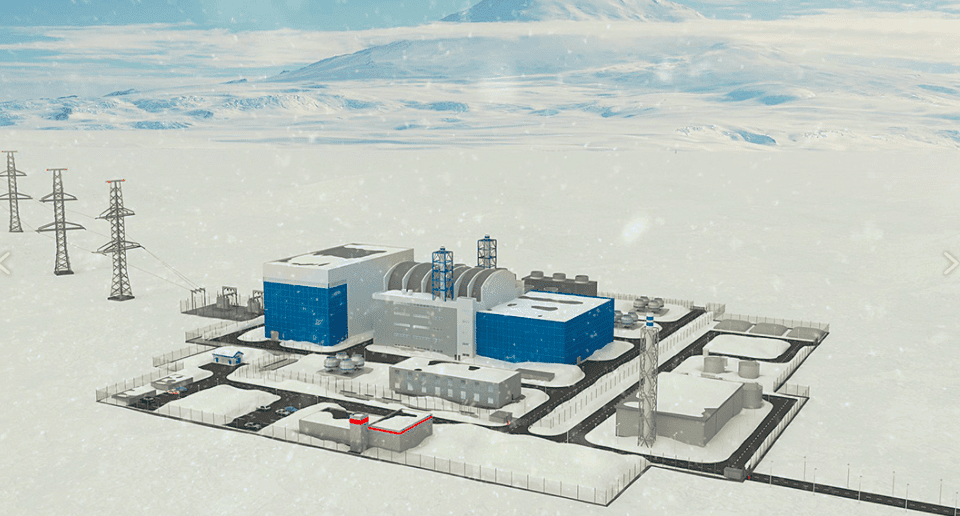Icebreaker Reactor Approved for Ground-Based Nuclear Plant
The international business arm of Russia’s state-owned nuclear power company has received a license that will allow construction of small modular reactors (SMRs), based on the design used in the country’s icebreaker shipping fleet, at ground-based nuclear power plants.
Rusatom Overseas JSC (RAOS JSC), the company representing parent company Rosatom’s international interests, on Aug. 9 announced it was granted the license from the Federal Service for Environmental, Technological and Nuclear Supervision—known as Rostekhnadzor—that will allow construction to proceed. The license specifically was granted authorizing Rusatom Overseas to move forward with a project to build an SMR with a RITM-200N reactor at a site in Ust-Kuyga, in the Republic of Sakha (Yakutia), Russia.
The Yakutia SMR project is based on technology from Rosatom used in the design of the RITM-200 reactor that powers the icebreaker ships. The RITM-200 is an integrated generation 3+ pressurized water reactor, developed by OKBM Afrikantov—a Russian nuclear engineering company—and designed to produce 55 MW of power. The RITM-200 improves upon the design of the KLT-40, a nuclear fission reactor used in earlier Russian icebreakers and floating nuclear power stations.

The icebreakers are nuclear-powered ships that are purpose-built for use in waters covered with ice; Russia is the only country using such ships. The icebreakers primarily have been used to support shipping in frozen Arctic waters north of Siberia, in what is known as the Northern Sea Route (NSR).
Monday’s announcement comes two weeks after Rosatom said it would for the first time begin building icebreakers that could be powered by liquefied natural gas (LNG), an idea the company had previously abandoned.
‘Milestone’ for the Project
Rosatom officials on Monday said the licensing for the SMR at Yakutia is a “milestone” for that project, which resulted from an agreement signed by Yakutia officials and Rosatom in September 2019. Aysen Nikolayev, leader of the Sakha Republic, in December of last year said, “I am confident that the SMR nuclear power plant will provide impetus to the development of Yakutia’s arctic regions and industries located in Ust-Yansky District, and improve standards of living of local residents.”
Oleg Sirazetdinoz, vice president of RAOS JSC, in a statement Monday said, “We have reached another milestone within our work on the SMR project in Yakutia by receiving the Rostekhnadzor license. It is an important step on our way to successful implementation of this the project which completion is scheduled for 2028.”
Six RITM-200 reactors are currently installed on what Rosatom calls “state of the art” icebreakers—the Arktika, Sibir, and Ural fleets. The company said an additional four RITM-200 reactors will be installed on other icebreakers currently under construction.
Rosatom and the Sakha Republic signed an agreement for the SMR project on Dec. 23, 2020. Yakutia officials said the agreement calls for the republic to offtake as much as 50 MW of power from the SMR after its completion, with Yakutia also assisting in site preparation for the project. Officials on Monday said most of the engineering surveying for the site is complete, along with development of the environmental impact assessment.
Construction of the SMR is expected to begin in 2024.
Sirazetdinov, speaking at a seminar last fall that focused on the Yakutia project, said, “The ground-based nuclear power plant is designed to supply power to isolated power systems or remote areas and consumers. It is distinguished by its compactness and modularity, a shortened construction period and high safety standards. I am confident that the project will not only accelerate the development of Yakutia, but will also strengthen Russia’s leading position in the field of nuclear energy on the world market.”
LNG-Fueled Icebreakers
The announcement of Rosatom’s renewed interest in LNG-powered icebreakers comes three years after discussion of a similar program. Novatek, a natural gas producer with several LNG projects in the Arctic, in 2018 had signed on to help Rosatom develop LNG-fueled icebreakers, but that plan was not implemented. Novatek has LNG-powered icebreakers in service along the NSR, operated by Russian shipping company Sovcomflot.
Rosatom has said LNG-powered icebreakers could be built for about 60 billion rubles ($814 million), half the cost of construction of a nuclear-powered ship.
Russian officials have said they want to increase the amount of cargo transported through the NSR to as much as 80 million tonnes annually; about 33 million tonnes of cargo was shipped through those waters last year. Russia has said it wants to increase the shipping of hydrocarbons, including oil and natural gas, that are produced in the Arctic.
“We are now returning to this topic [building LNG-powered icebreakers],” said Alexei Likhachev, Rosatom’s CEO, in late July. “I think that by the end of the year we will decide on the possible construction of two to four medium-sized icebreakers.”
—Darrell Proctor is a senior associate editor for POWER (@POWERmagazine).